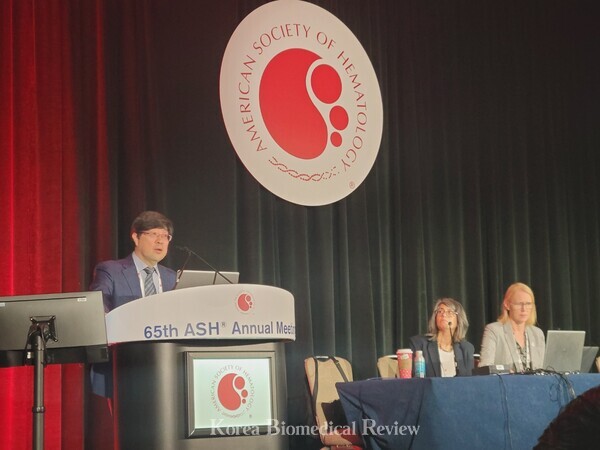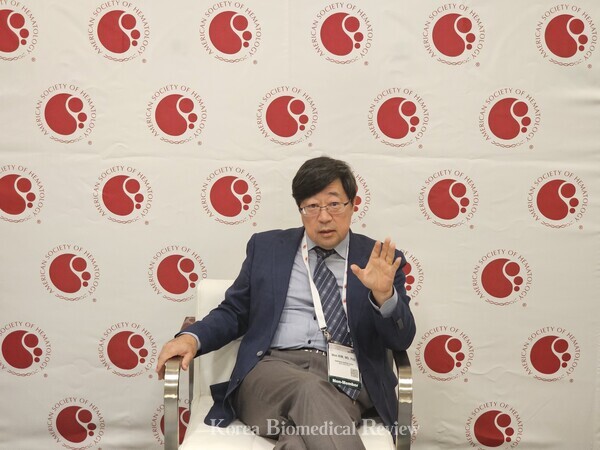SAN DIEGO, Calif. – By Lee Han-soo/Korea Biomedical Review correspondent -- A recent study presented at the American Society of Hematology (ASH) 2023 conference in San Diego has highlighted the potential benefits of combining AbbVie's epcoritamab and lenalidomide for patients with relapsed/refractory (R/R) diffuse large B-cell lymphoma (DLBCL).

The study, known as EPCORE NHL-5, was presented by Professor Kim Won-seog at Samsung Medical Center.
DLBCL patients, especially those with a history of ineffective treatments, including salvage chemotherapy and autologous stem cell transplantation, often face bleak prognoses. CAR-T cell therapy, although effective for some, only offers long-term remission in about 40 percent of cases. In this context, the EPCORE NHL-5 trial brings a ray of hope.
The study focused on the safety and efficacy of epcoritamab, a subcutaneous CD3xCD20 bispecific antibody, which received accelerated FDA approval and has shown deep and durable responses as a single agent in prior trials, in combination with lenalidomide, an oral drug.
In this trial, adult patients with CD20+ R/R DLBCL underwent 12 cycles of the combination treatment.
As of May 22, 2023, 26 patients had received this combination therapy. The median duration of exposure to both drugs was around 3.8 to 4.0 months. The treatment led to one dose-limiting toxicity (neutropenia) and common Grade 3–4 treatment-emergent adverse events, including neutropenia, anemia, thrombocytopenia, and febrile neutropenia. Cytokine release syndrome (CRS) was mostly low-grade and predominantly occurred after the first full dose. The overall response rate among response-evaluable patients was 75 percent, with complete metabolic responses in 58 percent and partial responses in 17 percent of participants.
Addressing the conference, Professor Kim emphasized the depth and sustainability of the response to this combination therapy, especially in high-risk patient groups.
"The combination of epcoritamab and lenalidomide showed a deep and sustained response in patients with high-risk diseases," Professor Kim said. "This includes those who were non-responsive to initial treatment, older patients, and patients with prior CAR-T therapy experience."

Following his presentation, Professor Kim met with Korea Biomedical Review to provide a more detailed analysis of the trial.
"Epcoritamab and lenalidomide combination therapy has a promising mechanism as the CD3xCD20 bispecific antibody bound to CD20 on cancer cells and to CD3, inducing T cells and thereby creating an anti-cancer effect," Kim said. "Lenalidomide has been known to activate T cells, and when used in combination, it can enhance the anti-cancer effect by activating T cells induced by the dual-specific antibody."
Kim stressed that despite initial concerns about potential side effects like Cytokine Release Syndrome (CRS) or Immune Effector Cell-Associated Neurotoxicity Syndrome (ICANS), which can occur in immunotherapies, the combination with lenalidomide does not seem to increase these immune-related adverse effects.
"As a result, the epcoritamab and lenalidomide combination is a promising and potentially widely applicable future treatment, marking a significant advance in the management of this challenging lymphoma subtype," Kim said.
Related articles
- [ASH 2023] ‘Hanmi’s AML drug tuspetinib shows high CR rate combined with venetocrax’
- [ASH 2023] Korean researchers suggest a drug-less future for CML patients
- [ASH 2023] Blood disorder innovators highlight latest progress at US meet
- [ASH 2023] New combo therapy for rare lymphoma shows encouraging outcomes
- ‘Domestic DLBCL secondary care landscape at its most vulnerable’

